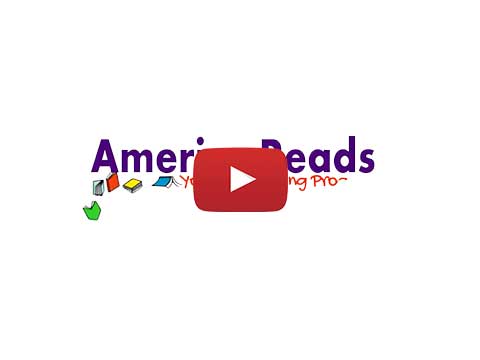America Reads Youth Mentoring Program
Founded in 2012, WCU's America Reads Youth Mentoring Program is an academic enrichment program that sends college students into the community to mentor youth in local after-school and childcare programs. College students serving as mentors build positive relationships with children, provide homework assistance, enhance social skill development of youth, and facilitate educational games and extracurricular activities while developing their own professional skills.
Currently, WCU partners with six community agencies to engage 40+ WCU student mentors with nearly 500 children each academic year.
Student Quotes
"I believe through my role in the America Reads Youth Mentoring Program, the students in the community have grown academically, and as people. They have grown as leaders, as friends, and as members of society. They know that they are important and that I care about them and their growth, and sometimes that's all a student needs to believe in themselves."
"Being a mentor has truly changed my college experience. Becoming an ARYM mentor has shown me how much the relationships I have impact other people's lives. Being able to help just one child on site makes all of the work and dedication worth it."
Community Voice
“The students at WCU are the heartbeat of our program because they provide an immeasurable service to our younger students… We view WCU as a really important partner. Together, we are providing academic, social, cultural, and civic support to the most underserved community of West Chester.”
- Ken Winston, Executive Director of The Charles A Melton Arts & Education Center
Become a Mentor!
If you are interested in becoming a mentor, contact the America Reads Youth Mentoring Program Coordinator to schedule an interview. Mentors can engage in this program as volunteers or through the Federal Work Study program. You can learn more about the Mentor experience below in the FAQs section.
Frequently Asked Questions (FAQs)
What is the time commitment of being a Mentor?
Mentors are expected to spend 6-10 hours each week mentoring youth in the community for at least one full semester. Staying involved in the program for a full academic year is highly encouraged, as this has the greatest impact on the children you are mentoring.
Mentors are also required to attend monthly program-wide Professional Development Workshops and monthly Reflection Meetings on campus. Monthly Professional Development Workshops gather all Mentors from across the program to provide skill development opportunities to be successful within and beyond the mentor role. Monthly Reflection Meetings are led by your student Site Leader, gathering the WCU Mentors from your respective community agency to discuss your experiences, reflect on the impact you are having on the children, and problem-solve any issues you are having on site.
Failure to complete these requirements can lead to removal from the program. If your class schedule prohibits you from attending a workshop or reflection meeting, you must notify the Program Coordinator to identify make-up opportunities.
Do I need clearances to become a Mentor?
In order to work with the youth in our community, you must complete three clearances:
- PA Child Abuse History Clearance: (Video tutorial available here, but please fast forward to 0:46, as the website has changed and the initial steps are no longer needed. Written instructions are also attached, but please skip the first 2 steps.) After completing this online form, they will mail you official results within 2 weeks. You will receive results via email in approximately one week. Save as PDF or on a flash drive for your records.
- PA State Police Clearance: (Video tutorial available here, and written instructions attached). Make sure you take a screen shot with your results and save it, as sometimes they aren’t emailed back to you but the results are provided instantly.
- FBI Fingerprinting Clearance: It costs $27.50 per person. Complete instructions can be found here. Register for an account and make an appointment, then visit a fingerprint center. Results will be mailed and then you will provide the results to be filed on campus.
All clearances must be turned into the Center for Community Engagement & Social Impact (and Human Resources if you are a Federal Work-Study student) prior to starting at your agency. Some agencies will require additional clearances in order to serve as a Mentor. These details will be outlined more clearly once you are placed at a specific agency.
How do I know if I am eligible for a Federal Work Study position?
In order to determine your eligibility, you must complete the FAFSA and state that you are interested in a Federal Work Study position. If you are unsure whether you completed this form, the easiest way to check your status is to contact Financial Aid at WCU.
Once you confirm you are Federal Work Study eligible, you must submit a Federal Work Study Student Employment Application and indicate on the application that you want to work in the America Reads Youth Mentoring Program. Financial Aid will review Federal Work Study applications in the order in which they were received. If you are next in line to be offered a Work Study position, the America Reads Youth Mentoring Program Coordinator will contact you to set up an interview to discuss the position and program expectations.
I need volunteer hours for a class. Can I earn them by participating in the America Reads Youth Mentoring Program?
Mentors are expected to spend 6-10 hours each week mentoring youth in the community for at least one full semester, as well as attend monthly program-wide Professional Development Workshops and monthly Reflection Meetings on campus. If you are willing and able to commit to those requirements, then this program can absolutely help you fulfill your volunteer hours for a class.
If you need a different type of volunteer experience for your class assignment, contact the Center for Community Engagement and Social Impact for assistance or visit us on the ground floor of Commonwealth Hall at the "Student Health Services" entrance to the building.
Do I have to be a certain major to participate?
Absolutely not! The America Reads Youth Mentoring Program is open to any student with a passion for helping youth in our community.
Do I need to have a car on campus in order to participate?
Nope! We partner with six different agencies within Chester County and some of our partners are within walking distance to campus. When you have your interview with the Program Coordinator, your transportation needs will be discussed when determining site placement.
Community Agencies
Click on each image to learn more about our community partners!

Charles A. Melton Center: New Directions
The mission of the historic Charles A. Melton Center is to contribute to the quality of life for all people of the greater West Chester community by continuing its long commitment of providing educational, recreational, cultural, and civic services.
- Program Hours: Monday - Thursday from 3:00 p.m. to 6:00 p.m.
- Youth: Kindergarten - 5th Grade
- Average # of Children: 25
- Mentor to Child Ratio: 1:2

Henderson High School
Henderson High School's Academic Intervention Program helps students in grades 9 to 12 enhance their academic experience by providing students with the necessary skills and abilities, as well as providing mentoring to the students.
Facts:
- Program Hours: Monday - Friday from 10:00 a.m. to 2:15 p.m.
- Youth: Grades 9 - 12
- Average # of Children: 8
- Mentor to Child Ratio: 1:3

Coatesville Kids to College
The mission of the Coatesville Kids to College program is to ensure that all the youth of Coatesville have the skills, resources and supports necessary for them to attend and successfully graduate from a college of their choice.The Coatesville Kids to College program operates Monday through Friday from 2:00 p.m. to 6:30 p.m.
Facts:
- Program Hours: Monday - Thursday from 2:30 p.m. to 6:30 p.m.
- Youth: Grades 1 - 8
- Average # of Children: 40
- Mentor to Child Ratio: 1:5

St. Agnes Day Room
The St. Agnes Day Room prepares preschool aged children to enter into kindergarten by focusing on literacy and academic skill development. This is a great placement for students interested in working with youth who speak Spanish.
Facts:
- Program Hours: Monday, Tuesday, Thursday from 9:30 a.m. to 2:30 p.m.; Wednesday & Friday from 10:00 a.m. - 2:30 p.m.
- Youth: Ages 3-5 years old
- Average # of Children: 30
- Mentor to Child Ratio: 1:7

Westside Community Center
The Afterschool Program at Westside Community Center provides a safe place where middle and high school students can come to escape the stresses they face on a daily basis through academic support and mentoring relationships.
Facts:
- Program Hours: Monday & Wednesday 3:00 p.m. to 5:30 p.m.
- Youth: Middle School Age
- Average # of Children: 20-25
- Mentor to Child Ratio: 1:5

YMCA: Childcare Early Learning Center
The YMCA Childcare Early Learning Center focuses on providing Pre-K and Kindergarten students with lessons carefully designed to activate children's imaginations and encourage lifelong, positive values.
Facts:
- Program Hours: Monday - Friday 6:30 a.m. to 6:30 p.m.
- Youth: Grades Pre-K - Kindergarten
- Average # of Children: 10 per room
- Mentor to Child Ratio: 1:10
Mentor Resources
Reading Comprehension Activities
- Ask questions relevant to the story before beginning the story
- Have the child draw a picture based on their favorite part in a story
- Use graphic organizers to summarize stories
- Make flash cards of vocabulary words
- Play reading comprehension board and word games
- Take breaks to ask questions about what is occurring in the story and what the child thinks will happen next
- Use hand and finger puppets to retell stories
- Write creative stories
- Build connections between the child and characters/activities in the story
In what stage of development is your reader?
- Emergent readers: These students can work with concepts of print and are at the very beginning stages of developing letter-sound relationships.
- Early readers: These students can call upon the cuing systems and pay close attention to visual cues and language patterns. These students begin reading for meaning by predicting.
- Transitional readers: These students are beginning to read at a good pace, which is a sign of overall comprehension. They are also able to utilize reading strategies to figure out words, but still need help understanding difficult text.
- Fluent readers: These students are reading independently. The teacher's main focus with these readers is to make sure they are competent in using the reading strategies to deepen comprehension.
Online reading comprehension games from first grade readers to advanced readers
Online Games
These online games can be used on the computer or a mobile device. Adobe Flash Player capabilities are necessary for all of the games listed below.
- ABCya.com
- Choose your grade level
- Several different games to help build your reading strategies and skills
- PrimaryGames
- Word games, sentence games, other content area games
- Free-time games
- RoomRecess.com
- Games developed by an elementary school teacher
- Build fundamental learning concepts in math, reading, spelling, language arts, and basic problem solving
- Between the Lions and PBS
- Stories and games
- Readers.com
- A website with links for kids ages 3-6, 6-10, 10+, and for teachers and parents
- Funbrain
- Reading games, math games, and free-time games
Google Play Apps
- Sight Words Reading Games Lite
- Over 300 sight words from Dolch Word List
- For grades PK-1st
- Kids Reading Sight Words Lite
- Listen to common words and identify correct sight word
- Learn to recognize common words at your reading level
- Improve reading skills by practicing words that they may have seen or are familiar with
- Improve reading fluency
Apple Store Apps
- Word Abacus
- News-O-Matic
- Daily non-fiction reading for kids
- Hideout: Early Reading
- Letter-sound association and word repetition


